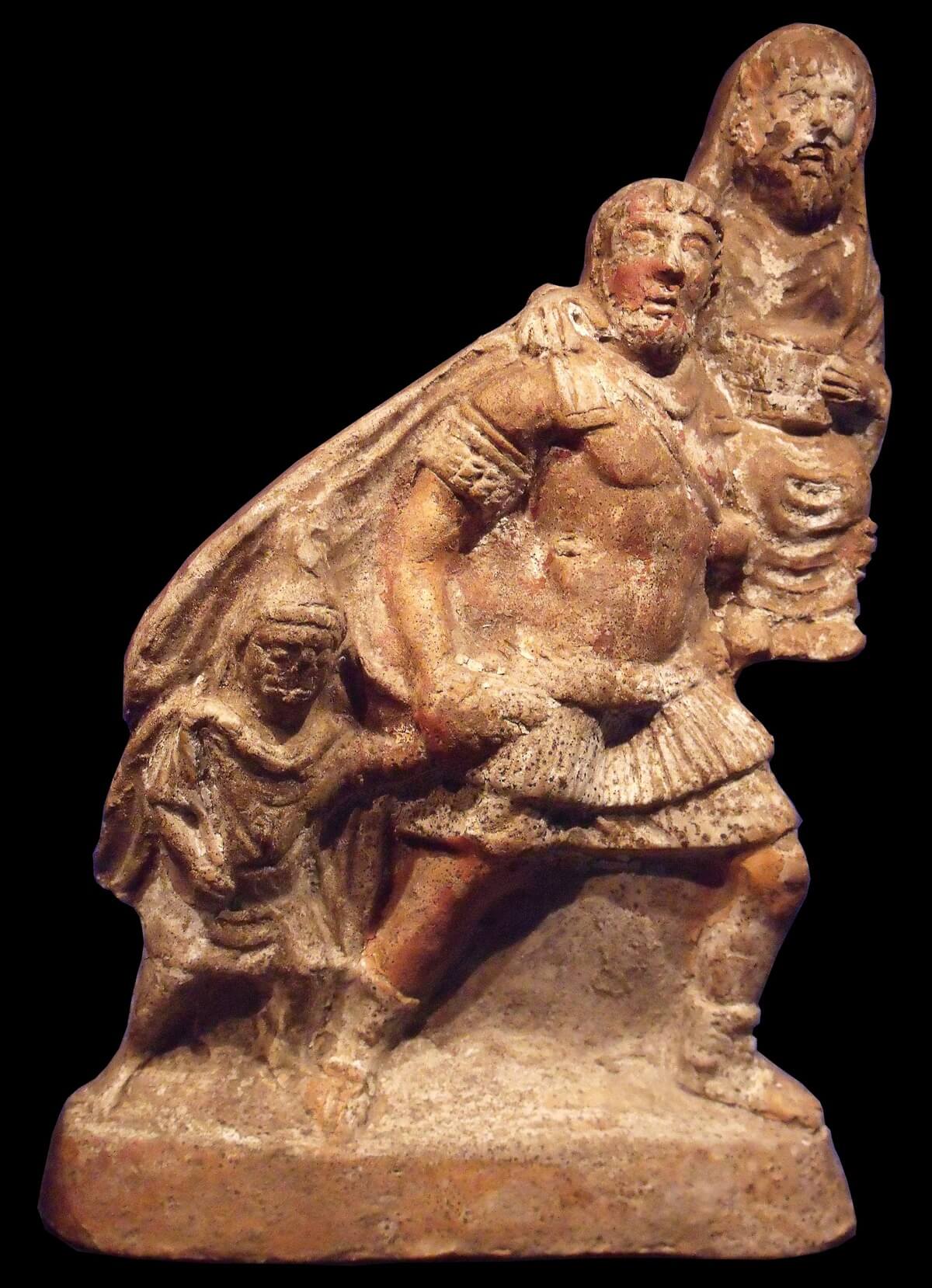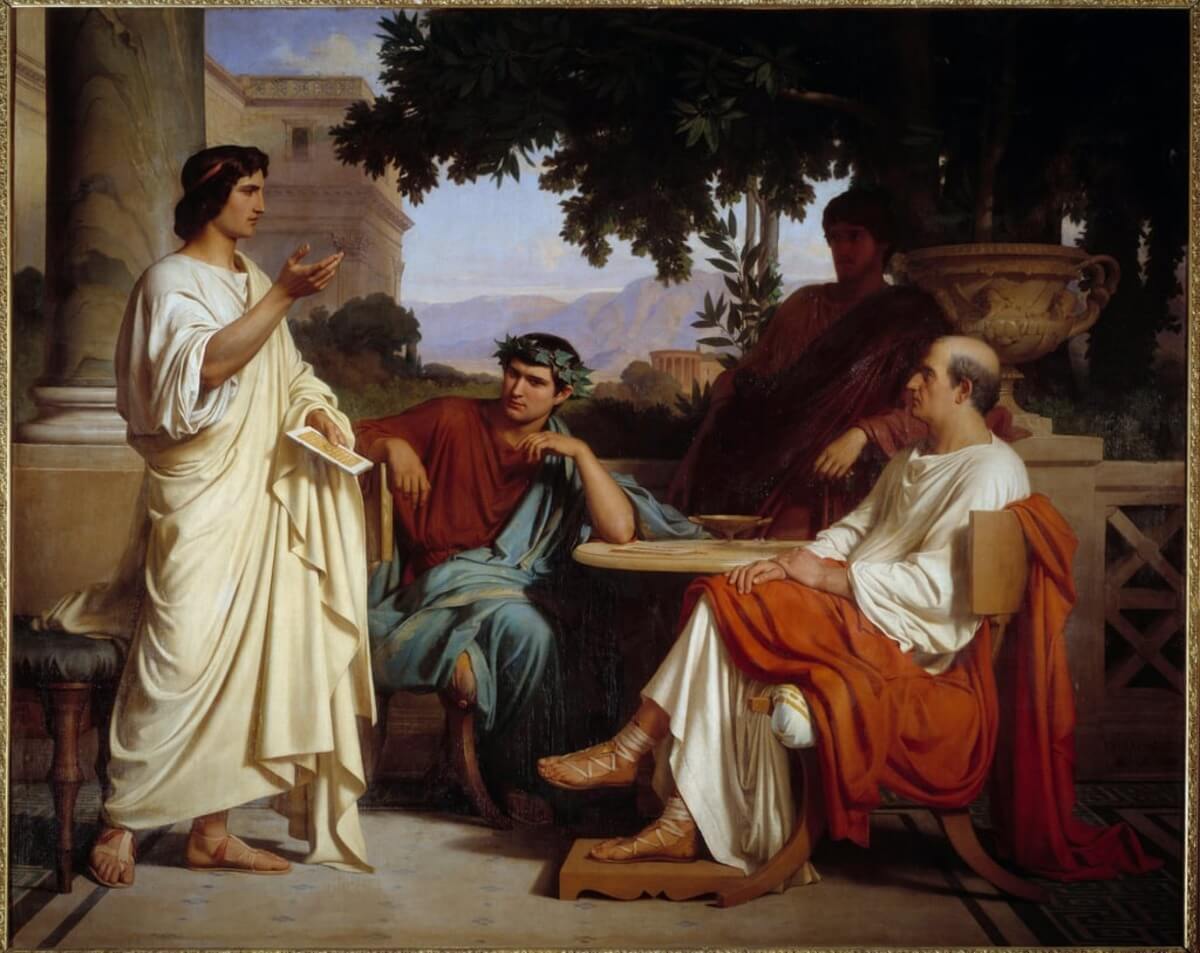Publius Vergilius Maro (Virgil) (70 - 19 BC)
Publius Vergilius Maro, commonly known as Virgil, was born on 15 October 70 BC in Andes (now called Virgilio), near Mantua, Italy. He was an ancient Roman poet of the Augustan period and became one of Rome's greatest poets. The son of a farmer in northern Italy, Virgil received his early education by attending schools in Mantua, and later continued his education in Milan and Rome.

Armando Mancini, CC BY-SA 2.0, via Wikimedia Commons
A bust of Virgil by Tito Angelini (1930) made from white marble.
Virgil's most notable works include three major poems: the Bucolics (or Eclogues), the Georgics, and his most famous work, the national epic called the Aeneid.
The Aeneid was written between 29 and 19 BC and remained unfinished at the time of his death on 21 September 19 BC in Brundisium. The epic tells the legendary story of the Trojan hero Aeneas, who travels to Italy and becomes the ancestor of the Roman people.
The Bucolics, also known as the Eclogues, is a collection of ten poetic pastoral dialogues inspired by the Greek poet, Theocritus. Written between 42 and 37 BC, these poems explore themes of love, nature, and the idealized life of shepherds and shepherdesses in the countryside.
The Georgics, composed between 37 and 29 BC, is a didactic poem consisting of four books that celebrate the art of agriculture, farming, and rural life.
Virgil enjoyed a strong relationship with Emperor Augustus, who admired his works and even commissioned the Aeneid. Virgil's poetry was a reflection of the political and social changes occurring in Rome at the time and remains influential in the study of Latin and Western literature.
In addition to his major poems, several minor poems are also attributed to Virgil, such as the "Culex," a short epyllion about a shepherd and a gnat, and the "Copa," a light pastoral work. However, some scholars believe that these works may have been written by other poets of the same period.
Despite the brevity of his career, Virgil's influence on the world of literature is immense, and his works have been a significant source of inspiration for countless writers and poets throughout history.
Education and Influences
During his education, Virgil was exposed to the works of Greek and Roman authors and poets, which would come to greatly influence his own writing style. He paid special attention to the writings of the famed Greek poet, Homer.
The influence of Homer is evident in Virgil's Aeneid, which mirrors Homer's epics - the Iliad and the Odyssey - in both structure and theme. In fact, the Aeneid has been regarded as an attempt to create a Roman equivalent to Homer's epics.
Virgil didn't limit his studies to literature and poetry alone; he also delved into philosophy and rhetoric. His affinity for philosophical thought is reflected in his other major works, the Bucolics (or Eclogues) and the Georgics. These works display a deep understanding of the natural world and the human condition, demonstrating how Virgil used philosophy as a tool to enrich the themes and meaning within his poetry.
As a result of his diverse education and influences, Virgil's work had a significant impact on Roman culture and beyond. His seamless synthesis of Greek and Roman literary traditions, combined with his philosophical insights, contributed to his reputation as one of Rome's greatest poets.
From examining the scope of Virgil's education and influences, it becomes apparent that his mastery of various disciplines played a crucial role in establishing his enduring legacy within the classical canon.
Major Works
The Aeneid
The Aeneid is considered one of the greatest works of Latin literature and is regarded as Rome's national epic. It consists of twelve books and combines elements from both the Iliad and the Odyssey.
The first six books are focused on Aeneas's journey, drawing inspiration from the Odyssey, while the remaining six books describe the battles and events leading to the founding of Rome, echoing the war narrative of the Iliad. Throughout the Aeneid, Virgil explores themes such as duty, destiny, and the values that define Roman identity.
Aeneas is portrayed as a virtuous character, adhering to the concept of pietas - duty towards the gods, country, and family. This key virtue defines his actions and decisions throughout the epic. Aeneas' destiny is to become the ancestor of the founders of Rome, and he is guided and supported by various gods, primarily his mother, Venus.
According to Roman mythology, Aeneas founded the city of Alba Longa, from which the legendary twins Romulus and Remus, the direct founders of Rome, were born.
The story goes that Romulus and Remus were the sons of Rhea Silvia, a descendant of Aeneas, and the god Mars. After a series of events, Romulus ultimately founded the city of Rome in 753 BC, with the myth serving as a symbolic link between the Trojan hero Aeneas and the birth of Rome. Divine intervention plays a major role in the events unfolding in the epic, with gods like Jupiter and Juno shaping the characters' fates.

Naples National Archaeological Museum, CC BY-SA 3.0, via Wikimedia Commons
A 1st century AD terracotta figurine portraying Aeneas escaping from Troy, carrying his father, Anchises, on his shoulders and giving his hand to his son, Ascanius.
Another significant character in Virgil's Aeneid is Dido, the queen of Carthage. When Aeneas arrives in Carthage, an illicit love affair between him and Dido ensues. However, due to Aeneas' duty and destiny, he must leave Dido, which eventually leads her to commit suicide.
This tragic event serves as a major turning point in the epic and highlights the theme of love's destructiveness. It also presents a historical and political context, as the episode metaphorically represents the conflict between Rome and Carthage.
In the Aeneid, sin is often exemplified by individuals who oppose the divine will or the destined foundation of Rome. For instance, Mark Antony and Cleopatra are depicted as negative figures, whose actions lead to their own demise.
Antony, a Roman general, and his involvement with the Egyptian queen, Cleopatra, were threatening Rome's national interests during that time. By including these historical characters in the Aeneid, Virgil points out their flaws and emphasizes the importance of selflessness and absolute commitment to Rome.
Eclogues
The Eclogues, also known as the Bucolics, are a series of ten pastoral poems composed by Virgil in the classical Latin language. These poems are largely concerned with the lives of shepherds in rural settings, and the beauty of the natural world. Virgil's vivid descriptions of the landscape, the changing seasons, and the lives of the shepherds serve to paint a rich portrait of the Italian countryside.
While the Eclogues can be read as individual poems, several overarching themes emerge throughout the series, such as the relationship between humanity and nature, the role of art and poetry in society, and the effects of political and social upheaval on rural life.
Georgics
The Georgics, a didactic poem written in four books, serves as a practical guide to agriculture and farming, covering topics such as the cultivation of crops, animal husbandry, beekeeping, and the importance of hard work.
In addition to providing practical advice, the Georgics celebrates the virtues of rural life and explores the relationship between humans and the land they cultivate. The poem also contains allegorical elements, with the agricultural practices serving as metaphors for the development of a just and orderly society. Through the Georgics, Virgil portrays the act of farming as an essential component of Roman identity and ideals.
Ancient Rome and Its Influence
Ancient Rome left a significant imprint on the world and, as mentioned, one area in which this is evident is its rich literary tradition. The works of Roman poets such as Virgil still endure and shape the study of classical literature today.
During the era in which Virgil lived, the Roman world underwent significant political transformations, as the Roman Republic transitioned into the Roman Imperial period led by emperors.
Julius Caesar played a key role in this shift, as he amassed power and ultimately met his untimely end. Augustus, Caesar's adopted son, managed to consolidate power, laying the foundation for the Roman Empire and becoming its first emperor.
The city of Rome served as the epicenter of this empire, and its influence spread far and wide, shaping the political and cultural landscape of the Roman world. Roman authors, including Virgil, came from various walks of life and regions, enriching Rome's literary tradition. As a product of this diverse environment, Virgil created his masterpieces by drawing on this rich cultural heritage.
The Roman Empire, under the guidance of leaders such as Augustus, expanded its territories and facilitated the dissemination of Roman culture, values, and arts. This cultural exchange enabled the works of Roman poets to reach far and wide, casting a lasting influence on future generations.
Virgil in the Modern World
Virgil continues to hold a significant influence on modern literature, arts, and culture. His timeless works have inspired countless writers and shaped the foundation of Western literature.
One of the most notable examples of Virgil's impact is his appearance in Dante Alighieri's epic poem, The Divine Comedy. In this narrative, Dante chooses Virgil as his guide through Hell and Purgatory, a symbolic representation of Virgil's status as a wise and respected poet. Dante’s admiration for Virgil’s works led him to incorporate Virgil's poetic style and mastery of the Latin language into his own writing.
The Aeneid has had a lasting effect on the literary world. This national epic of Rome has gone on to influence notable writers such as Edmund Spenser, John Milton, and Alexander Pope. The Aeneid is often studied in schools and universities for its vivid portrayal of Roman culture, mythology, and values.
Additionally, Virgil's works have served as a basis for many modern adaptations in various artistic mediums. Operas, plays and films have reimagined Virgilian narratives, demonstrating the universal appeal of his themes and characters. The beauty and elegance of his poetry continue to be admired in today's literature, and his works are frequently translated and republished.
Although Virgil died in 19 BC, his impact on Latin literature and the Western canon is undiminished. As a founder of a tradition that spans over two millennia, his works remain essential reading for both literature enthusiasts and scholars. The poetry of Virgil endures as a testament to his talent, contributing to his lasting legacy as an influential poet whose work continues to captivate and inspire readers across generations.
Studying Virgil's life and his diverse body of work provides an insightful look into the creative genius and cultural context that shaped the early Roman Empire.
Works:
Did you know...
Gallia Cisalpina meant "This side of the Alps" from Rome's point of view, as opposed to Transalpine Gallia.



